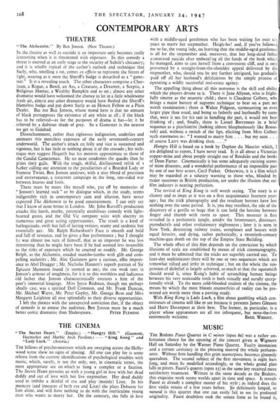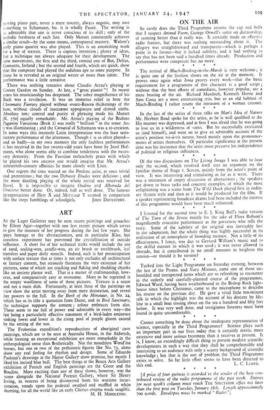MUSIC
THE Brahms Piano Quartet in C minor (opus 6o) was a rather un- fortunate choice for the opening of the concert given at Wigmore Hall on Saturday by the Warner Piano Quartet. Faulty intonation and a certain aesitancy in the phrasing marred the whole perform- ance. Without firm handling this grim masterpiece becomes gloomily querulous. The second subject of the first movement is eight bars long, and must be modelled accordingly, or the whole grand plan falls to pieces. Faure's quartet (opus 15) in the same key received more satisfactory treatment. Written in the same decade as the Brahms, this exquisite work seems worlds apart in time and space. It reveals Faure as already a complete master of his style ; as indeed does the
first violin sonata of a few years before. deliciously limpid, so natural is this quartet that one can easily fail to see its profound originality. Faure doubtless took the sonata form as he found it,. • moving piano part, never a mere tracery, always organic, may owe something to Schumann, btr. it is wholly Faure. The writing is so admirable that one is never conscious of its skill ; only of the I melodic freshness of each line. Only Mozart consistently achieves a similar result—by the same means, contrapuntal mastery. Walton's early piano quartet was also played. This is an astonishing work for a boy of sixteen. There is copious invention ; plenty of ideas, but a technique not always adequate for their development. The slow movements, the first and the third, remind one of Bax, Delius, Goossens, Ireland ; but the second and fourth, which are quick, show that the composer had played the sedulous ape to some purpose. In these he is revealed as an original writer of more than talent. The performance was a little tentative.
There was nothing tentative about Claudio Arrau's playing at Covent Garden on Sunday. At last, a " great pianist "! In recent years his musicianship has deepened. The sober magnificence of his Bach was a revelation. It was an immense relief to hear the Chromatic Fantasy played without ersarz-Busoni thickenings of the base, without Clouds of inaccurate appogiaturk and clotted sixths. Absolute ton: control and purity of phrasing made his Mozart [K. 570] equally remarkable. Mr. Arran's playing of the Brahms Paganini Variations (Book 2) was really " brilliant " in the sense it was illuminating ; and the Carnaval of Schumann was a re-creation. In some ways this intensely Latin interpretation was the least satis- factory performance of the afternoon. Though is so often played— and so badly—in my own memory the only faultless performances it has received in the last twenty-odd years have been by Josef Hof- mann, who alone seems able to combine tenderness with the neces- sary dexterity. From the Faustian melancholy grace with which he played his two encores one would imagine that Mr. Arran's nineteenth-century affinities lie more closely with Liszt.
One regrets the time wasted on the Poulenc ,suite, at once trivial and pretentious ; but the two Debussy Etudes were delicious ; and the most dazzling playing of the whole recital was reserved for Ravel. It is impossible to imagine Ondine and Alborada del Gracioso better done. Or, indeed, half as well done. The famous in:eripretations of Herr X and Mons:eur Y seemed in comparison



































 Previous page
Previous page